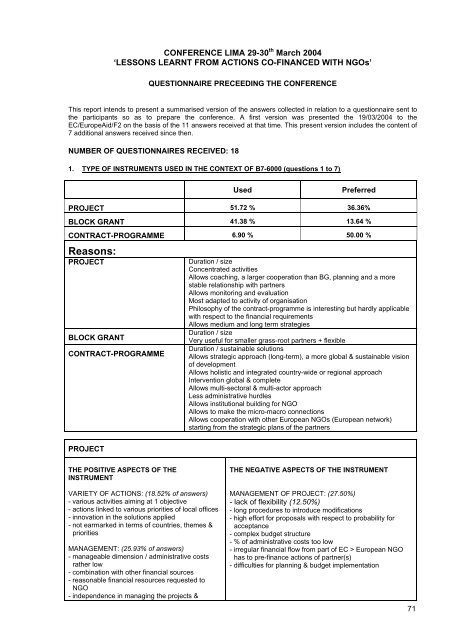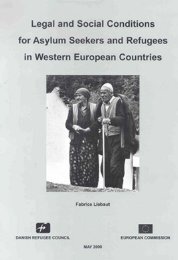INFORME DEL SEMINARIO REGIONAL
INFORME DEL SEMINARIO REGIONAL
INFORME DEL SEMINARIO REGIONAL
You also want an ePaper? Increase the reach of your titles
YUMPU automatically turns print PDFs into web optimized ePapers that Google loves.
CONFERENCE LIMA 29-30 th March 2004<br />
‘LESSONS LEARNT FROM ACTIONS CO-FINANCED WITH NGOs’<br />
QUESTIONNAIRE PRECEEDING THE CONFERENCE<br />
This report intends to present a summarised version of the answers collected in relation to a questionnaire sent to<br />
the participants so as to prepare the conference. A first version was presented the 19/03/2004 to the<br />
EC/EuropeAid/F2 on the basis of the 11 answers received at that time. This present version includes the content of<br />
7 additional answers received since then.<br />
NUMBER OF QUESTIONNAIRES RECEIVED: 18<br />
1. TYPE OF INSTRUMENTS USED IN THE CONTEXT OF B7-6000 (questions 1 to 7)<br />
Used Preferred<br />
PROJECT 51.72 % 36.36%<br />
BLOCK GRANT 41.38 % 13.64 %<br />
CONTRACT-PROGRAMME 6.90 % 50.00 %<br />
Reasons:<br />
PROJECT Duration / size<br />
Concentrated activities<br />
Allows coaching, a larger cooperation than BG, planning and a more<br />
stable relationship with partners<br />
Allows monitoring and evaluation<br />
Most adapted to activity of organisation<br />
Philosophy of the contract-programme is interesting but hardly applicable<br />
with respect to the financial requirements<br />
Allows medium and long term strategies<br />
Duration / size<br />
BLOCK GRANT<br />
CONTRACT-PROGRAMME<br />
PROJECT<br />
THE POSITIVE ASPECTS OF THE<br />
INSTRUMENT<br />
VARIETY OF ACTIONS: (18.52% of answers)<br />
- various activities aiming at 1 objective<br />
- actions linked to various priorities of local offices<br />
- innovation in the solutions applied<br />
- not earmarked in terms of countries, themes &<br />
priorities<br />
MANAGEMENT: (25.93% of answers)<br />
- manageable dimension / administrative costs<br />
rather low<br />
- combination with other financial sources<br />
- reasonable financial resources requested to<br />
NGO<br />
- independence in managing the projects &<br />
Very useful for smaller grass-root partners + flexible<br />
Duration / sustainable solutions<br />
Allows strategic approach (long-term), a more global & sustainable vision<br />
of development<br />
Allows holistic and integrated country-wide or regional approach<br />
Intervention global & complete<br />
Allows multi-sectoral & multi-actor approach<br />
Less administrative hurdles<br />
Allows institutional building for NGO<br />
Allows to make the micro-macro connections<br />
Allows cooperation with other European NGOs (European network)<br />
starting from the strategic plans of the partners<br />
THE NEGATIVE ASPECTS OF THE INSTRUMENT<br />
MANAGEMENT OF PROJECT: (27.50%)<br />
- lack of flexibility (12.50%)<br />
- long procedures to introduce modifications<br />
- high effort for proposals with respect to probability for<br />
acceptance<br />
- complex budget structure<br />
- % of administrative costs too low<br />
- irregular financial flow from part of EC > European NGO<br />
has to pre-finance actions of partner(s)<br />
- difficulties for planning & budget implementation<br />
71
















